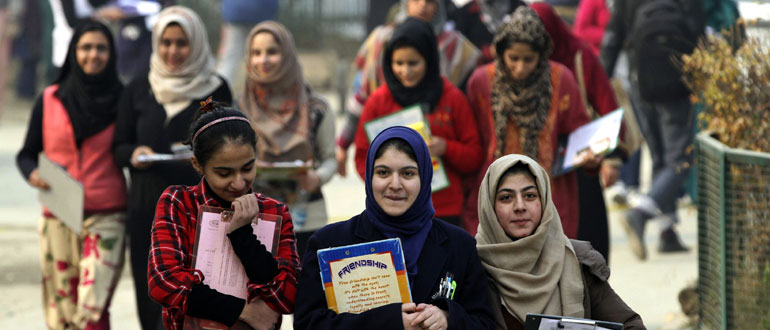Srinagar | WTNS | Feb 28: : Language is congenital to the interpretation of culture. It is the medium through which people communicate values, ideas, beliefs and customs thus it has an important social function and cultivates feelings of group identity and solidarity among the different communities, experts said on Tuesday.
Experts said that there is nothing wrong in learning other languages but we should not feel shy in speaking our own language and should teach it first to the children.
Noted historian Zareef Ahmad Zareef said that the important duty of parents is to teach their mother tongue to their children at least six to seven years and then they can learn other languages as well.
“Kashmiri is a classical language and has a script of around 1600 years. We have a written history of around 5500 years,” he said.
He said that people of Kashmir are unconscious and are taking everything lightly and everyone here must speak native language as it is our identity.
“We are trying to speak other languages so as to feel superior but in the process we are losing our own identity,” he said, adding that there is no science book in Kashmiri because we aren’t taking anything serious.
Noted writer Dr Tanveer Hayat said that unconsciously Kashmiri language is alive, but consciously it is dead.
“We are speaking this language during our conversation in day to day life at home, at public places and even in emergencies we speak in our mother tongue. We erect sign boards at Kashmir University in English language not in Kashmiri, that’s the sign of our being dead consciously,” Hayat said.
Language is not only a means of communication but it also represents a diverse cultural and intellectual heritage, he said.
As per UNESCO’S report, more than 6,700 languages are spoken worldwide but at least 40% are threatened with extinction, he said, adding that we can’t ignore that language is fundamental to the communication of all kinds and communication plays an important role in making change and development in human society.
Let us tell you that the International Year of Languages was created when linguistic diversity was increasingly threatened, he added.
Shabnam Tilgami, member of Sahitya Academy and General Secretary Adbe Markaz Kamraz (AMK) told that in last few years, Kashmiri language has started to come back on track which wasn’t seen before as it has reached in our schools, colleges and universities and its introduction in educational institutions has helped in its promotion.
He said Kashmiri is being spoken in Kashmir and several parts of Jammu and language remains alive by poets and writers and in the last few years.
He said that it is the duty of every individual to protect and preserve the mother language that is our identity and this language deserves to be given the status of classical language.
This language has come into existence even before Urdu and English and steps must be taken for its promotion, he said.
Meanwhile an official of art culture and languages told that the government is taking various steps to preserve and promote Kashmiri language and many programs in Kashmiri are being conducted at the cultural academy.
In his message on the International Mother Tongue Day, Dr Farooq while remarking on the importance of preserving the linguistic heritage of Jammu and Kashmir said the mother tongue must be the medium of instruction in schools especially at formative stages.
“It lays a strong foundation for the expression of creativity and personality development. It also fosters creativity at the formative stages. As far as Kashmiri language is concerned, it is richly endowed with classical as well as folk literature watered over thousands of years by various poets, sages, rhetoricians and linguists. Having a large number of speakers, Kashmiri enjoys the privilege of being one of 22 languages mentioned in the Eighth Schedule, yet that does not put the language out of risk of getting extinct. Therefore the need of the hour calls for taking radical steps to protect it and propagate it. Urdu, no doubt glues all the people of Jammu and Kashmir together, but languages like Kashmiri, Dogri, Pahari, Gojri, Punjabi, Shina should not be relegated to obscurity,” he said, as per a statement issued to the Wilayat Times.
Calling for a comprehensive strategy to help keep Kashmiri, Dogri, Punjabi and other languages in Jammu and Kashmir alive, he called for prioritizing it in the education sector, especially during formative years of learning. In addition he emphasized on having special grants for scholars pursuing research programmes in vernacular languages. He urged the parents to use their local mother tongues as a medium of communication in their homes.
“Communicating in one’s mother tongue should be a matter of pride for all of us in Jammu and Kashmir,” he added.
On 21 February, International Mother Language Day, UNESCO calls on countries to pursue a policy of multilingual education. The Organization advises children are taught in their mother tongue during the earliest years of their schooling, which can be combined with the official language of instruction, an approach known as multilingual education.
National Conference President and Member of Parliament from Srinagar, Dr Farooq Abdullah Tuesday said the mother tongue is the underlying component of one’s culture and identity and that every effort should be made to protect the linguistic diversity of Jammu and Kashmir.



